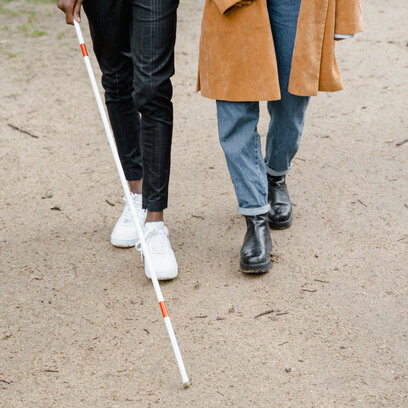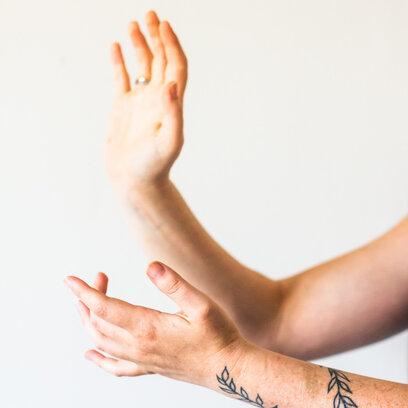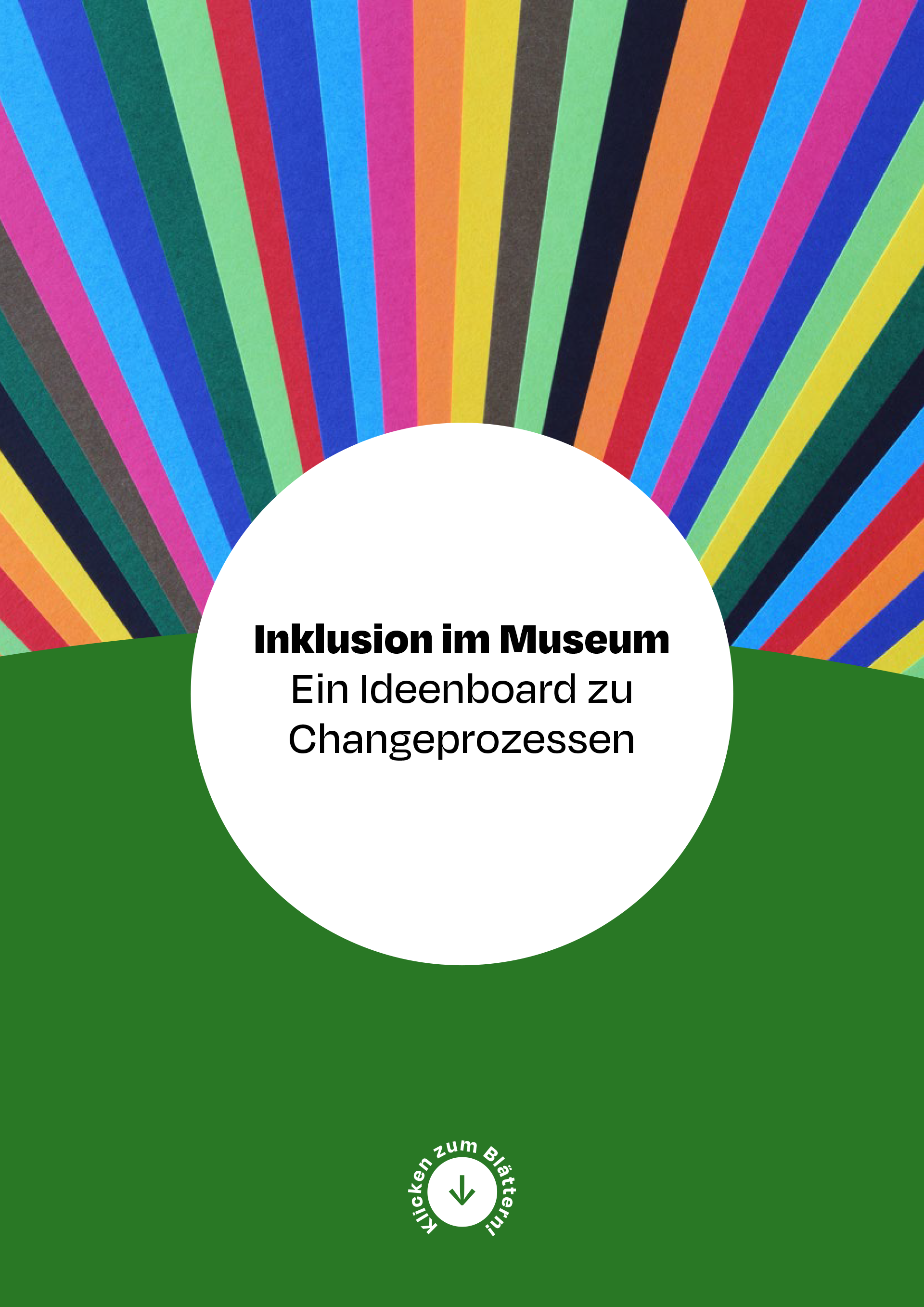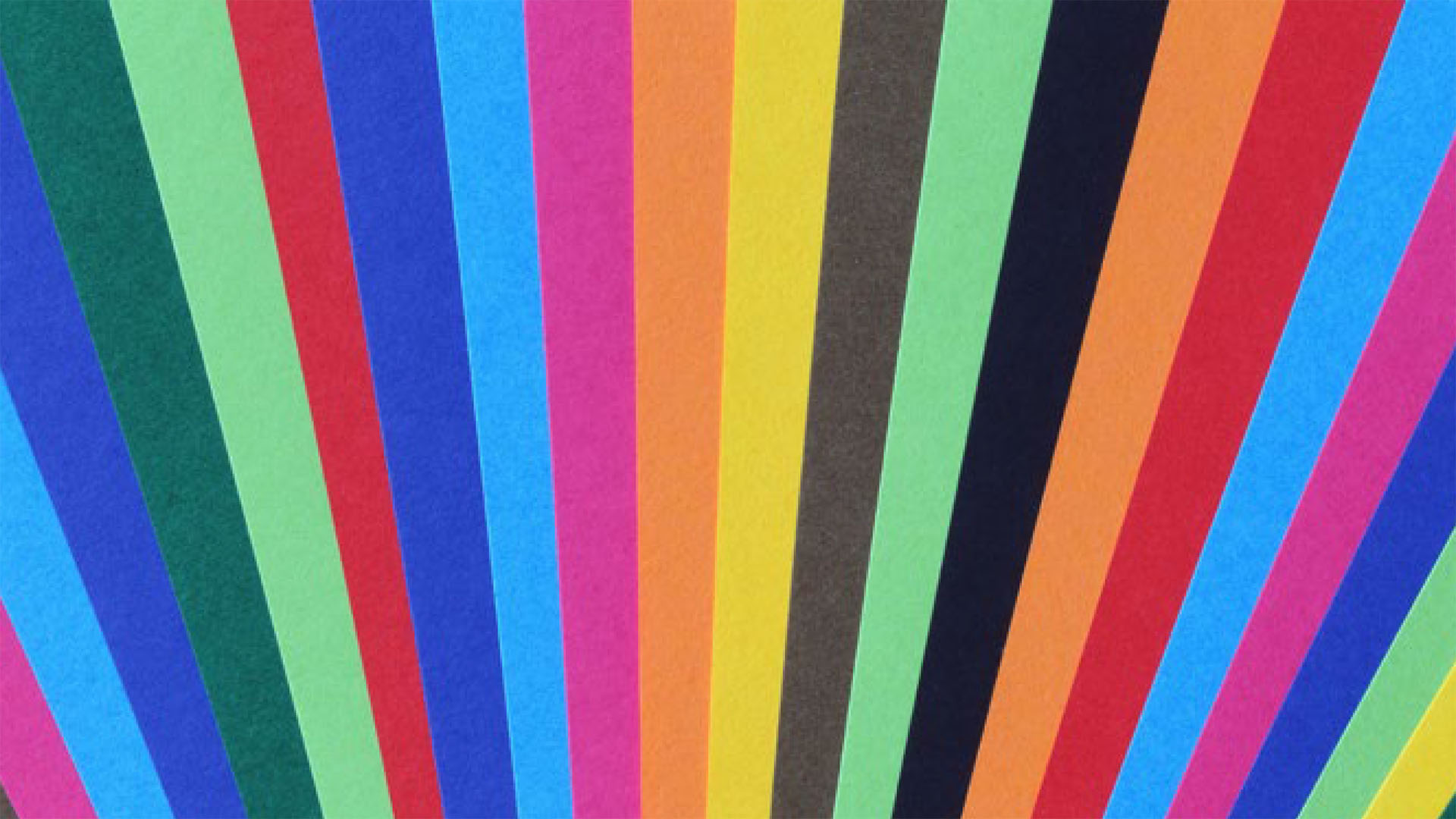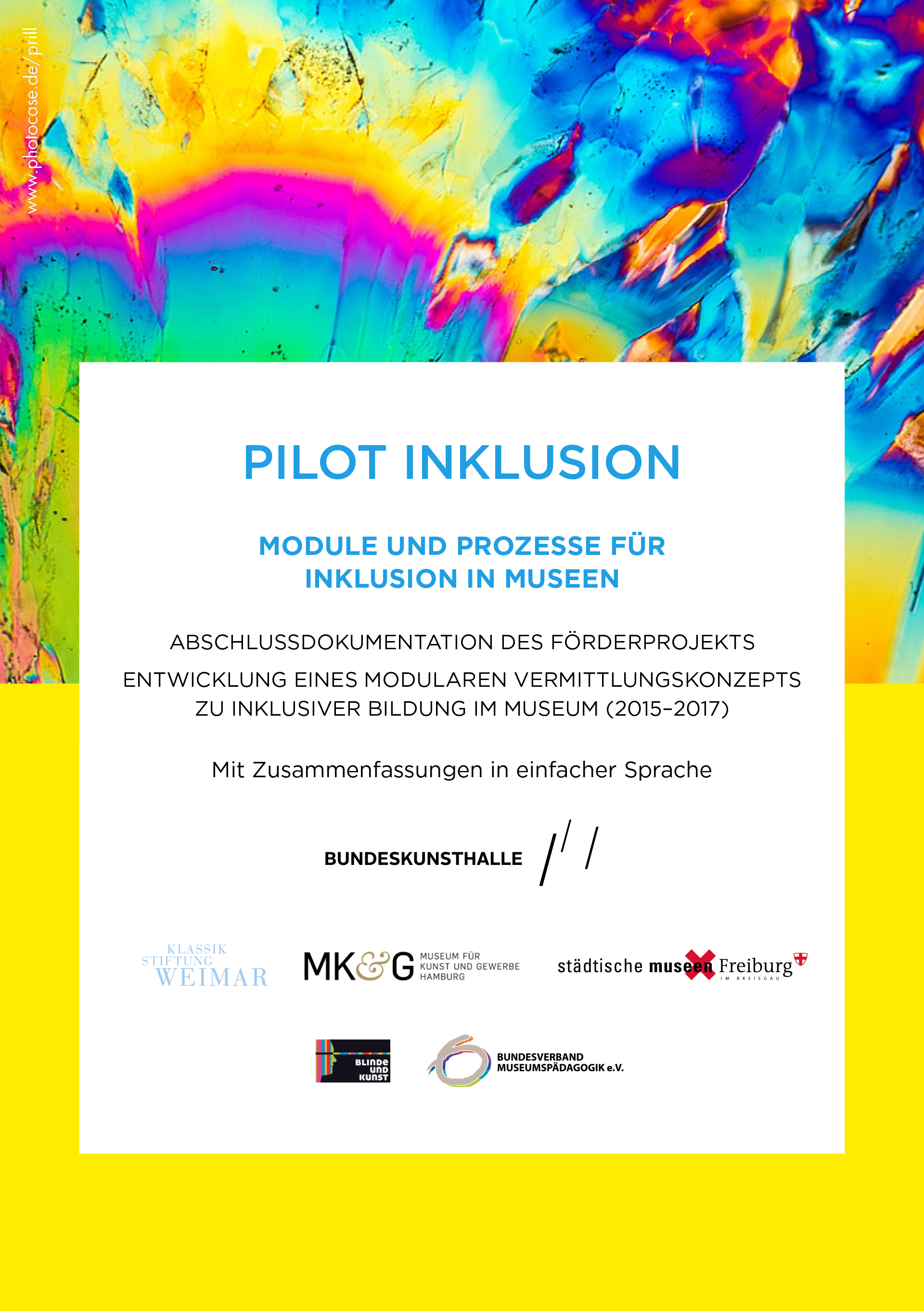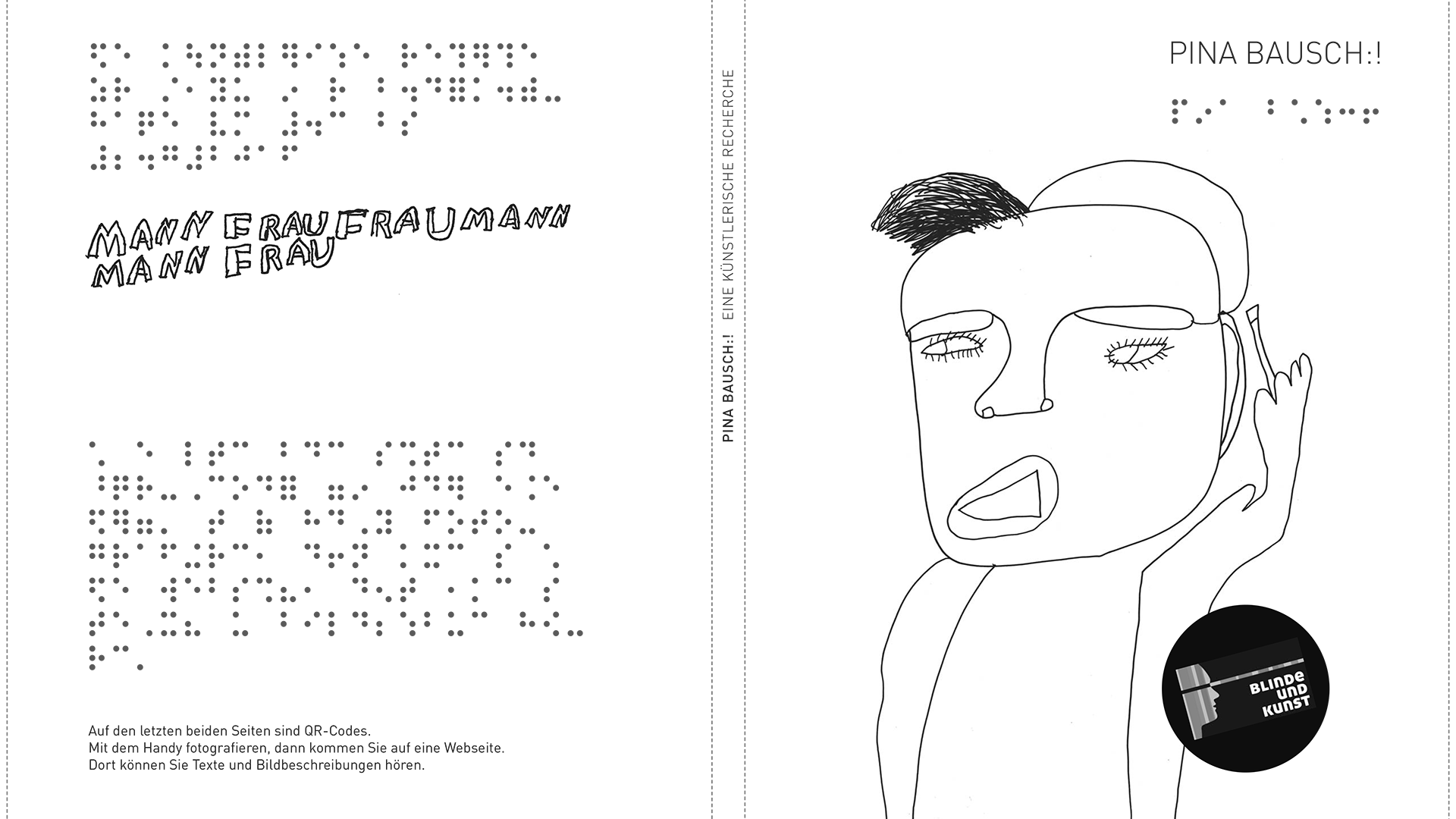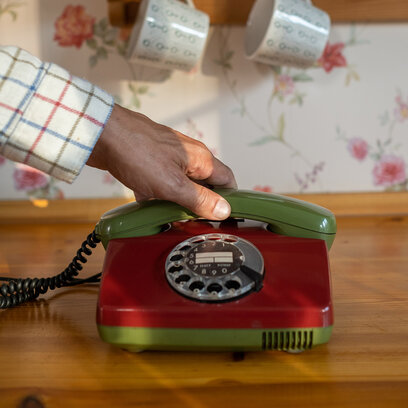
The Bundeskunsthalle is inclusive, service-orientated and demography-proof.
On the way to an inclusive Bundeskunsthalle
The Bundeskunsthalle actively addresses inclusion and the challenges of a changing society with regard to demographic change. We see it as our task to provide all visitors with creative and individual access in the spirit of cultural participation.
This applies to visiting the exhibitions as well as to the accompanying education and outreach programme. We therefore develop special educational programmes for people with special needs. In doing so, we utilise access possibilities with all senses; the use of different materials, models or replicas has a supporting effect. In terms of content and methodology, we cater to the individual needs of our visitors. Creative discovery and inquisitive research on the part of every visitor are important prerequisites for the success of this educational work.
All offers are aimed at different age groups and are also suitable for school classes. Get in touch with us, we will be happy to advise you.
If you have any further questions or suggestions regarding barrier-free offers or the accessibility of our museum, please do not hesitate to contact us. Please continue to support us on our way to becoming an inclusive museum!
We are committed to helping people with special needs and are organised nationwide in various working groups, such as the working groups Inclusion and Accessibility in Museums and Generation 60plus in Museums (specialist group: dementia), which were founded by the Federal Association of Museum Education. She also contributed to the publication Das inklusive Museum. A guide to accessibility and inclusion (2013), published by the German Museums Association, in which the Bundeskunsthalle was also involved.
Through regular dialogue with those affected and associations, we try to develop step-by-step solutions for a successful inclusive exhibition visit.
How accessible is the Bundeskunsthalle?
Current offers
More eventsFunding project: Verbund Inklusion
The funding project Verbund Inklusion (2018-2023) was completed in May 2023. Following the results of the first Pilot Inclusion project, seven museums developed, tested and evaluated solutions for an inclusive change process in the museum institution. In the comprehensive final documentation "Inclusion in museums. A board of ideas for change processes", all participating co-operation partners describe different solutions on the way to an inclusive institution. The process was supported in an advisory capacity by the Bundesverband Museumspädagogik e. V. and the Netzwerk Kultur und Inklusion. The documentation is practice-orientated and is aimed at museum colleagues from all departments.
The project consortium consisted of the Bundeskunsthalle Bonn (project management) with the co-operation partners Deutsches Historisches Museum Berlin, Stiftung Deutsches Hygiene Museum Dresden, Stiftung Haus der Geschichte der Bundesrepublik Deutschland Bonn, Klassik Stiftung Weimar, Museum für Kunst und Gewerbe Hamburg, Schleswig-Holsteinische Landesmuseen Schloss Gottorf. The Bundesverband Museumspädagogik e.V. and the Netzwerk Kultur und Inklusion e.V. supported the project.
The first funding project, Pilot Inklusion (2015-2017), focussed on the development of innovative modules for educational and mediation work as part of a largely inclusive and barrier-free design of exhibitions and museums. The follow-up project Verbund Inklusion (2018-2022; coronavirus-related extension until 2023) now focussed on the generally necessary structural changes within various types of museums on the way to becoming an inclusive institution with cultural offerings for all people.
Over a period of more than four years, the necessary conditions such as resources and work processes were modelled and empirically tested and described in cooperation with seven institutions. Forward-looking and transferable approaches were developed, for example with regard to inclusion and accessibility, for an inclusive design of existing exhibitions or new collection presentations or inclusive organisational and institutional development. In addition to the individual projects and measures, the time, personnel and financial resources required were also documented and analysed. At the end of the project, these results can be utilised by museums and other institutions throughout Germany.
Verbund Inklusion was funded by the Federal Government Commissioner for Culture and the Media on the basis of a decision by the German Bundestag.
Free download of the final documentation Verbund Inklusion [in German]
Funding project: Pilot Inklusion
The three-year Pilot Inclusion funding project came to an end in December 2017. Together with museums and associations, the Bundeskunsthalle developed innovative solutions to make exhibitions and museums inclusive and barrier-free. To this end, exhibition themes were communicated in a multi-sensory way.
Different perspectives from people with disabilities created diversity and a more attractive quality of experience for the exhibitions. The added value for all visitors was at the centre of the project. In the spirit of participation, the association Blinde und Kunst e.V. was involved in all processes from the outset. The final documentation "Pilot Inklusion. Modules and processes for inclusion in museums" presents examples.
Modules and processes for inclusion in museums.
The results of the three-year collaboration were discussed by the cooperation partners on 3 and 4 December 2017 at the symposium "For an inclusive society. Diversity and the museum of tomorrow" at the Bundeskunsthalle. Among the important topics were questions about the reorientation of museums in a diverse society, participation and the prerequisites for successful inclusion.
Cooperation partners of the funding project were the Klassik Stiftung Weimar, the Museum für Kunst und Gewerbe Hamburg, Städtischen Museen Freiburg, the Verein Blinde und Kunst e. V. and the Bundesverband Museumspädagogik.
Pilot Inklusion was funded by the Federal Government Commissioner for Culture and the Media on the basis of a decision by the German Bundestag, as well as Aktion Mensch and the Kämpgen Foundation.
Free download of the final documentation Pilot Inclusion [in German]
Pina Bausch: An artistic research
The book was created as part of the Pilot Inklusion funding project. The project focussed on the development of a modular educational concept for inclusive education in museums. Artistic research was carried out in cooperation with Blinde und Kunst e. V., Kunsthaus KAT18/GWK, Cologne and the Pina Bausch Foundation, Wuppertal and is available from the Walther König bookshop in the Bundeskunsthalle.
Pina Bausch: An artistic research at the Walther König bookstore
Feel free to contact us!
Contact
Birgit Tellmann
birgit.tellmann (at) bundeskunsthalle.de
+49 228 9171–291
Information & registration
buchung (at) bundeskunsthalle.de
+49 228 9171–243
Monday to Thursday 9 am to 3 pm
Friday 9 am to 12 am
If you contact us by e-mail outside these times, especially at weekends and on public holidays, we will process your request on the following working day.
